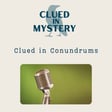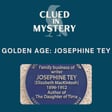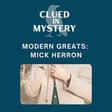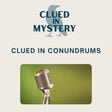
Unsolved Mysteries
As much as we love coming up with the solution before the sleuth in fictional mysteries, there is something about unsolved mysteries that is fascinating. In today's episode, Brook and Sarah discuss four well-known unsolved mysteries and their enduring appeal.
A quick note: two of the mysteries we discuss in this episode involve the deaths of real people, which can be more upsetting to hear about than fictional cases. We don't get into detail, but understand if you choose to skip this one.
Discussed
The Five: The Untold Lives of the Women Killed by Jack the Ripper (2019) Hallie Rubenhold
https://www.jack-the-ripper.org/
A Private Disgrace: Lizzie Borden by Daylight (2012) Victoria Lincoln
The Trial of Lizzie Borden (2019) Cara Robertson
Amelia Earhart Part I: The Lady Vanishes | Podcast | Overheard at National Geographic
Amelia Earhart Part II: The Lady’s Legacy | Podcast | Overheard at National Geographic
D.B. Cooper, Where are You? (2022) Netflix
For more information
Instagram: @cluedinmystery
Contact us: hello@cluedinmystery.com
Music: Signs To Nowhere by Shane Ivers – www.silvermansound.com
Website



![[Re-release] Anthony Berkeley image](https://media.zencastr.com/cdn-cgi/image/width=112,quality=85/image-files/61e1c276e3ec42007857cff9/e7c778ac-a2ba-4809-9a5c-7cd39d167834.jpg)
![[Bonus] Wake Up Dead Man image](https://media.zencastr.com/cdn-cgi/image/width=112,quality=85/image-files/61e1c276e3ec42007857cff9/e276ac32-e664-464f-956c-7699bdb60aa5.jpg)








![[Bonus] Read Along: Daughter of Time image](https://media.zencastr.com/cdn-cgi/image/width=112,quality=85/image-files/61e1c276e3ec42007857cff9/b953ad72-c43e-48ca-a18a-b3c216ab90ee.jpg)





